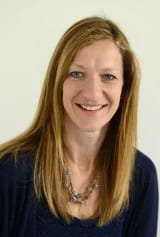
As part of our #BristolUniWomen campaign to mark International Women’s Day 2021, we’re meeting women from across the University of Bristol community who have been using their expertise to tackle the pandemic, from carrying out world-class research to helping on the frontline of the NHS.
Caroline Relton is Professor of Epigenetic Epidemiology in Bristol Medical School: Population Health Sciences (PHS) and MRC Integrative Epidemiology Unit, and Director of the Bristol Population Health Science Institute. She’s working on a major research project to track COVID-19 infections in Bristol schools.
Your research has focussed on COVID-19 recently. Could you tell us a little more?
My research is in Epigenetic Epidemiology and focuses on the causes and consequences of molecular changes to the genome in normal development and diseases, such as cancer, using population-based approaches.
With all schools closed early in the COVID-19 pandemic it became apparent the impact on children’s learning and wellbeing and how important it was to get pupils and staff back to school and minimise further closures.
Working with the city council, school heads and Public Health England, I applied for funding from the NIHR-UKRI to carry out a major research project to track coronavirus infections in Bristol schools.
The project, COVID-19 Mapping and Mitigation in Schools (CoMMinS), began last autumn with saliva-testing several thousand pupils and staff from schools across the city over the course of the school year. The aim of the study is for us to understand patterns of infections, the role of symptoms in identifying infection and the longer-term impacts of Covid-19 in children. The study also aims to provide school heads with the tools to identify cases early so they can keep their schools open and allow the continuity of education.
What have been the biggest challenges or triumphs for you during the pandemic?
The pandemic has brought a range of new opportunities and challenges for me at work. I have tried to maintain my usual research activity – understanding how epigenetics can be useful in understanding and predicting health and disease – as well as responding to the new research challenges that the pandemic has thrown up. With a large group of colleagues from many disciplines, I’ve been working closely with school leaders and the city council to help schools to operate during the pandemic.
Undertaking a research project that at the same time has practical benefit to the community is really rewarding. The pace of change has been challenging though; coping with changes in infection levels in the community, changes in government policies and guidance in schools, and changes to modes of testing have all complicated the study.
What is it like being a woman in academia/medicine (adapt)? Have there been times when you have either faced inequality or had to challenge it?
I enjoy being a woman in academia. For me it is a profession that has allowed me to use a wide range of skills; organisational, social, intellectual, communication and others. I find it a privilege to work in a profession where learning is part of daily life, but the underlying mission is for the benefit of others.
A career in academia is challenging for anyone and being a woman possibly adds to those challenges. For those women who have a children or other caring responsibilities, there is always a tension in trying to do the right thing for everyone. There have been times when my contribution has been assumed to be as a ‘token’ woman rather than based on what skills or expertise I may have been able to contribute. I’ve never challenged this directly but sought to prove my worth when I’ve suspected this to be the case.
Which women have inspired you in your career?
I’ve been inspired by many mentors, colleagues, family and friends – both men and women. My identical twin sister deserves a special mention as we have always been quietly inspired by each other’s successes as we have pursued scientific careers in parallel in academia and in industry. I gain my inspiration from traits rather than specific people and try to recognise qualities that I respect and admire. Commitment, compassion, generosity and resilience are attributes I value highly, and these can be found in many walks of life.
What advice would you give to your 13-year-old self?
To believe in yourself and not place limits on what you are capable of. An academic career was never on my horizon, but I guess we don’t know what we are capable of until we try?
What are you most proud of?
My two sons. They have grown in to such adaptable and capable young adults and I couldn’t be prouder. They have always respected and supported my career and have never taken issue with the sacrifices that have occasionally been involved due to long hours, ‘lost’ weekends or time away from home.
